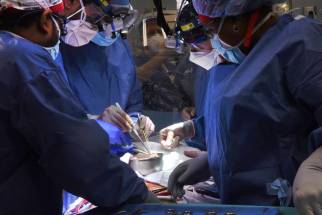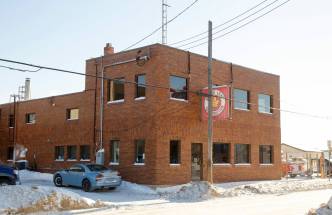Task force initiatives will do little to help surgical backlog
Read this article for free:
or
Already have an account? Log in here »
To continue reading, please subscribe:
Monthly Digital Subscription
$0 for the first 4 weeks*
- Enjoy unlimited reading on winnipegfreepress.com
- Read the E-Edition, our digital replica newspaper
- Access News Break, our award-winning app
- Play interactive puzzles
*No charge for 4 weeks then price increases to the regular rate of $19.00 plus GST every four weeks. Offer available to new and qualified returning subscribers only. Cancel any time.
Monthly Digital Subscription
$4.75/week*
- Enjoy unlimited reading on winnipegfreepress.com
- Read the E-Edition, our digital replica newspaper
- Access News Break, our award-winning app
- Play interactive puzzles
*Billed as $19 plus GST every four weeks. Cancel any time.
To continue reading, please subscribe:
Add Free Press access to your Brandon Sun subscription for only an additional
$1 for the first 4 weeks*
*Your next subscription payment will increase by $1.00 and you will be charged $16.99 plus GST for four weeks. After four weeks, your payment will increase to $23.99 plus GST every four weeks.
Read unlimited articles for free today:
or
Already have an account? Log in here »
Hey there, time traveller!
This article was published 19/01/2022 (1420 days ago), so information in it may no longer be current.
On the short list of tough decisions that any responsible government must make, sending patients out of your jurisdiction to get health-care services you cannot provide has to be among the hardest.
Sending people away for health care is an admission of failure. To admit that failure, and do the right thing, requires political leaders who demonstrate the maturity to put the needs of their citizens ahead of their own political fortunes.
So let it be said that Premier Heather Stefanson and her Progressive Conservative government have taken the first step in showing that maturity with its decision to send 300 patients requiring spinal surgeries to North Dakota.
Sending patients to a facility in Fargo was one of four initiatives unveiled Wednesday by Manitoba’s diagnostic and surgical recovery task force in its first major report since being struck six weeks ago to deal with a growing, estimated backlog of more than 153,000 surgical and diagnostic procedures.
On top of contracting out spinal surgeries to an American clinic, up to 1,000 laparoscopic gynecological surgeries will be moved out of hospitals and into private surgical centres, more clinical assistants to support anesthesiologists will be hired and new screening tools for bowel cancers will be introduced to reduce the number of endoscopies and free up time in hospital operating rooms.
Taken together, these are positive first steps. However, it must be noted they are also very small first steps that have taken an inordinate amount of time to be unveiled.
Health Minister Audrey Gordon told reporters she was gratified to provide the first, concrete initiatives to reduce backlogs “about a month” after the task force was created. That is a charitable portrayal of the length of time it took the Tory government to approve these modest solutions.
Depending on where you want to start the clock, this is a government that took at least three months to reach this point. Let’s remember that Gordon claimed as early as last October that a task force or steering committee had been struck to deal with the backlogs. Its physical existence, however, wasn’t announced until Dec. 8.
Fast-forward another six weeks, and we finally get to Wednesday’s announcement.
Rather than taking “about a month” to get to this point, the PC government has been stuck in a state of administrative paralysis, unable to introduce even the most modest of urgent, interim measures to deal with the crisis.
To be completely fair to Gordon and her task force, reasonable expectations do need to be part of this discussion.
There is no DoorDash or Amazon for elective surgeries, at least not yet. There is no app where you can order a hip-replacement and have it delivered in less than an hour, or overnight with a Prime membership.
In other words, we should not expect this process to create on-demand services for elective surgeries and diagnostic procedures. The health-care system provides on-demand services only for emergent cases, and that’s as it should be.
It’s also reasonable to assume that both the private surgical centres being used in Manitoba and the not-for-profit health network in North Dakota that will perform the spinal surgeries need some time to figure out how and when they can accommodate the additional procedures.
However, is it reasonable to wait three months to launch initiatives such as this, particularly when Doctors Manitoba and others have been recommending some of these things for the past year?
Did the PC government really need a task force to help it find the political fortitude to look at out-of-province options? And, more importantly, if it works for spinal surgeries, why has this government not been able to strike similar deals for hips, knees, cataracts?
Task force members confirmed Wednesday that based on current capacities, Manitoba is currently facing more a year’s worth of delayed procedures in areas such as hips and knees, cataracts and endoscopies.
This week, the task force offered ideas that could potentially remove about 1,300 cases off the province’s massive wait lists.
If and when we escape the pandemic, there will be an opportunity to do a deeper dive into the foundational problems in the health-care system that existed before the virus, and how they were so easily exacerbated when COVID-19 burst onto the scene.
It’s not just the provincial government; previous NDP and Tory governments in Manitoba failed to find solutions to the bottlenecks that created lengthy wait lists. The current government did itself no favour with its austere management of health care over the last five years, but no leader or party in this province has been able to find solution to this problem.
The pandemic may — ultimately and ironically — turn out to be the event that finally broke the logjam. There is nothing better than a crisis to force medical professionals and their political masters to make the tough decisions they have long put off and embrace new ideas that have been floating around, largely ignored, for years.
With Wednesday’s announcement, there is reason to believe that we’re at least headed in the right direction. Whether we continue to move in that direction remains to be seen.
dan.lett@winnipegfreepress.com

Born and raised in and around Toronto, Dan Lett came to Winnipeg in 1986, less than a year out of journalism school with a lifelong dream to be a newspaper reporter.
Our newsroom depends on a growing audience of readers to power our journalism. If you are not a paid reader, please consider becoming a subscriber.
Our newsroom depends on its audience of readers to power our journalism. Thank you for your support.
History
Updated on Wednesday, January 19, 2022 7:46 PM CST: Fixes typo.





